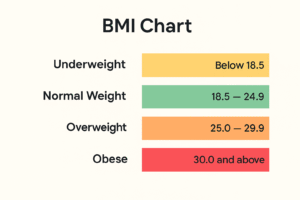BMI Calculator
🧮 Free BMI Calculator – Track Your Health Smarter, Not Harder
Wondering if your current weight is healthy for your height? Use our free, modern BMI Calculator to instantly find out where you stand. It’s fast, mobile-friendly, and gives a visual snapshot of your health — no math needed!
At ShowMyBMI.com, we don’t just provide numbers — we give you insights. This guide explains how BMI works, what your score means, its limitations, and how to use it as part of a healthier lifestyle.
📖 What Is BMI (Body Mass Index)?
Body Mass Index (BMI) is a simple screening tool used globally to assess whether your weight is within a healthy range based on your height. While it doesn’t directly measure fat, it gives a good estimate of whether you’re underweight, at a healthy weight, overweight, or obese.
✅ Formula:
BMI = weight (kg) ÷ (height in meters)²🔍 Example:
If your weight is 70 kg and height is 1.75 meters,
BMI = 70 / (1.75 × 1.75) = 22.86
📊 BMI Classification – Know Your Category
According to World Health Organization (WHO) standards, BMI values are grouped as follows:
| BMI Range | Classification |
|---|---|
| Below 18.5 | Underweight |
| 18.5 – 24.9 | Normal Weight |
| 25 – 29.9 | Overweight |
| 30 and above | Obese |
🔵 Healthy BMI Range: 18.5 – 24.9

Want to visualize it? Our calculator features a colorful speedometer-style gauge to help you understand your result at a glance.
⚙️ Use Our Free Advanced BMI Calculator
Our calculator is designed to be fast, simple, and smart. You can input:
Height and weight (US or Metric units)
Age and gender (to personalize insights)
Get downloadable results (PDF)
Clear visual categorization with color indicators
👉 Try our BMI calculator now and take the first step toward your health goals.
💡 What Does Your BMI Say About Your Health?
Understanding your BMI helps you monitor risks and adjust your lifestyle. Here’s a quick overview:
🔻 Underweight (<18.5)
May indicate poor nutrition, fatigue, or immunity concerns.
Learn more – NHS on being underweight
✅ Normal Weight (18.5–24.9)
Generally linked with lower health risks, better mobility, and balanced wellness.
⚠️ Overweight (25–29.9)
Can increase chances of heart issues, joint pain, or sleep apnea.
🚨 Obese (30+)
Associated with a higher likelihood of diabetes, high blood pressure, and heart disease.
Explore – CDC on obesity and health
🥗 Personalized Health Tips Based on BMI
Whether you’re aiming to gain, maintain, or lose weight, these basic tips can guide you:
Underweight? Prioritize calorie-dense, nutrient-rich foods like whole grains, nuts, and healthy oils.
Healthy BMI? Maintain your balance with regular activity and mindful eating.
Overweight or Obese? Focus on portion control, fiber-rich meals, and consistent exercise.
👉 Try our Calorie Calculator to plan your daily intake based on your goals.
⚖️ Is BMI Always Accurate?
Not quite. BMI is a broad tool, and it doesn’t consider everything:
| Limitation | What It Misses |
|---|---|
| Muscle vs Fat | Athletes may have higher BMI due to muscle mass |
| Fat Distribution | Visceral vs subcutaneous fat not considered |
| Age & Gender Variance | Older adults & women have different fat ratios |
| Ethnic Differences | Risks vary across populations at the same BMI |
| Fitness & Metabolic Markers | Ignores blood pressure, glucose, and cholesterol |
✅ This is why BMI is best used with other tools, like:
Body Fat Percentage Calculators
Waist-to-Height Ratio
Fitness & medical screenings
🔍 Why BMI Alone Isn’t a Full Health Picture
Your weight isn’t the only thing that matters. Someone with a “normal” BMI could still have health issues, and someone with a high BMI might be metabolically healthy.
BMI doesn’t measure:
Heart health
Mental health
Diet quality
Physical activity
Sleep habits
That’s why we’re expanding our tools soon! Stay tuned for our Body Fat Calculator and Waist Measurement Tracker — coming soon on ShowMyBMI.com.
🙋♂️ Frequently Asked Questions
1. Can I use BMI to set weight goals?
Yes, BMI provides a healthy target range based on your height, which you can use to set realistic goals.
2. Is BMI different for men and women?
The formula is the same, but men and women distribute fat differently. Our calculator considers gender for more tailored insights.
3. How often should I check my BMI?
Every 4–8 weeks is a good interval when monitoring lifestyle changes or fitness progress.
🎯 Final Thoughts: Know Your Number, Then Take Action
BMI is a helpful starting point — not a final judgment. When used with other health tools, it can offer powerful guidance toward smarter decisions.
✅ Calculate your BMI today
💾 Save your result, set your goal, and come back regularly to track your progress.
At ShowMyBMI.com, we’re here to help you make data-driven, healthy choices — starting with your BMI.